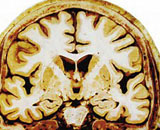
White matter refers to areas of the central nervous system that are mainly made up of myelinated axons also called tracts. Long thought to be passive tissue, white matter actively affects learning and brain functions, modulating the distribution of action potentials, acting as a relay and coordinating communication between different brain regions. White matter is named for its relatively light appearance resulting from the lipid content of myelin. However, the tissue of the freshly cut brain appears pinkish white to the naked eye because myelin is composed largely of lipid tissue veined with capillaries. Its white color in prepared specimens is due to its usual preservation in formaldehyde.
Organism species: Mus musculus (Mouse)
| CATALOG NO. | PRODUCT NAME | APPLICATIONS | |
| Models | n/a | Model for White Matter Injury (WMI) | Disease Model Customized Service Offer |
| Tissues | n/a | Tissue of White Matter Injury (WMI) (If Necessary) | Tissue Customized Service Offer |
| Serums | n/a | Serums of White Matter Injury (WMI) (If Necessary) | Serums Customized Service Offer |
Organism species: Rattus norvegicus (Rat)
| CATALOG NO. | PRODUCT NAME | APPLICATIONS | |
| Models | DSI731Ra01 | Rat Model for White Matter Injury (WMI) | Disease Model |
| Tissues | n/a | Tissue of White Matter Injury (WMI) (If Necessary) | Tissue Customized Service Offer |
| Serums | n/a | Serums of White Matter Injury (WMI) (If Necessary) | Serums Customized Service Offer |
Organism species: Oryctolagus cuniculus (Rabbit)
| CATALOG NO. | PRODUCT NAME | APPLICATIONS | |
| Models | n/a | Model for White Matter Injury (WMI) | Disease Model Customized Service Offer |
| Tissues | n/a | Tissue of White Matter Injury (WMI) (If Necessary) | Tissue Customized Service Offer |
| Serums | n/a | Serums of White Matter Injury (WMI) (If Necessary) | Serums Customized Service Offer |
